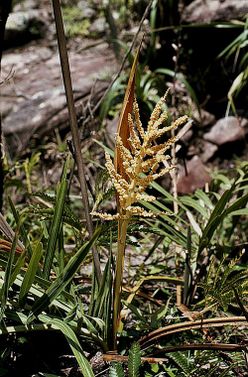Difference between revisions of "Syagrus harleyi"
| Line 23: | Line 23: | ||
Palm, up to 2 metres tall. Occasionally having just a single, un-branched stem, the plant more commonly produces a small clump of subterranean stems, each of which is topped by a rosette of 3 - 8 leaves up to 1.8 metres long. Editing by edric. | Palm, up to 2 metres tall. Occasionally having just a single, un-branched stem, the plant more commonly produces a small clump of subterranean stems, each of which is topped by a rosette of 3 - 8 leaves up to 1.8 metres long. Editing by edric. | ||
==Culture== | ==Culture== | ||
| − | + | From the tropics, it can also be grown in subtropical areas and might also succeed in warm temperate areas. The plant is probably tolerant of at least light frosts. Grows best in a sunny position, prefers a well drained soil, established plants are probably drought tolerant. | |
==Comments and Curiosities== | ==Comments and Curiosities== | ||
| − | Uses: The leaves are used locally as a kindling for lighting fires. The plant is occasionally cultivated as an ornamental. | + | Uses: The waxy leaves are used locally as a kindling for lighting fires. The plant is occasionally cultivated as an ornamental. |
<br style="clear:both;"/> | <br style="clear:both;"/> | ||
Revision as of 00:04, 27 April 2016
| Syagrus (sih-AHG-ruhs) harleyi (HAHR-leigh) | |||||||
|---|---|---|---|---|---|---|---|
 Photo by Dr. Simon Mayo, Royal Botanic Gardens, Kew/Palmweb. | |||||||
| Scientific Classification | |||||||
| |||||||
| Synonyms | |||||||
|
| |||||||
| Native Continent | |||||||
|
| |||||||
| Morphology | |||||||
| |||||||
| Culture | |||||||
|
| |||||||
| Survivability index | |||||||
|
| |||||||
| Common names | |||||||
|
| |||||||
Contents
Habitat and Distribution
Brazil Northeast. Chapada Diamantina. In rock crevices on montane savannah, at elevations from 400 - 1,400 metres altitude.Description
Palm, up to 2 metres tall. Occasionally having just a single, un-branched stem, the plant more commonly produces a small clump of subterranean stems, each of which is topped by a rosette of 3 - 8 leaves up to 1.8 metres long. Editing by edric.
Culture
From the tropics, it can also be grown in subtropical areas and might also succeed in warm temperate areas. The plant is probably tolerant of at least light frosts. Grows best in a sunny position, prefers a well drained soil, established plants are probably drought tolerant.
Comments and Curiosities
Uses: The waxy leaves are used locally as a kindling for lighting fires. The plant is occasionally cultivated as an ornamental.
- IMAGE GALLERY
External Links
References
Phonetic spelling of Latin names by edric.
Special thanks to Geoff Stein, (Palmbob) for his hundreds of photos.
Special thanks to Palmweb.org, Dr. John Dransfield, Dr. Bill Baker & team, for their volumes of information and photos.
Glossary of Palm Terms; Based on the glossary in Dransfield, J., N.W. Uhl, C.B. Asmussen-Lange, W.J. Baker, M.M. Harley & C.E. Lewis. 2008. Genera Palmarum - Evolution and Classification of the Palms. Royal Botanic Gardens, Kew. All images copyright of the artists and photographers (see images for credits).
Many Special Thanks to Ed Vaile for his long hours of tireless editing and numerous contributions.











